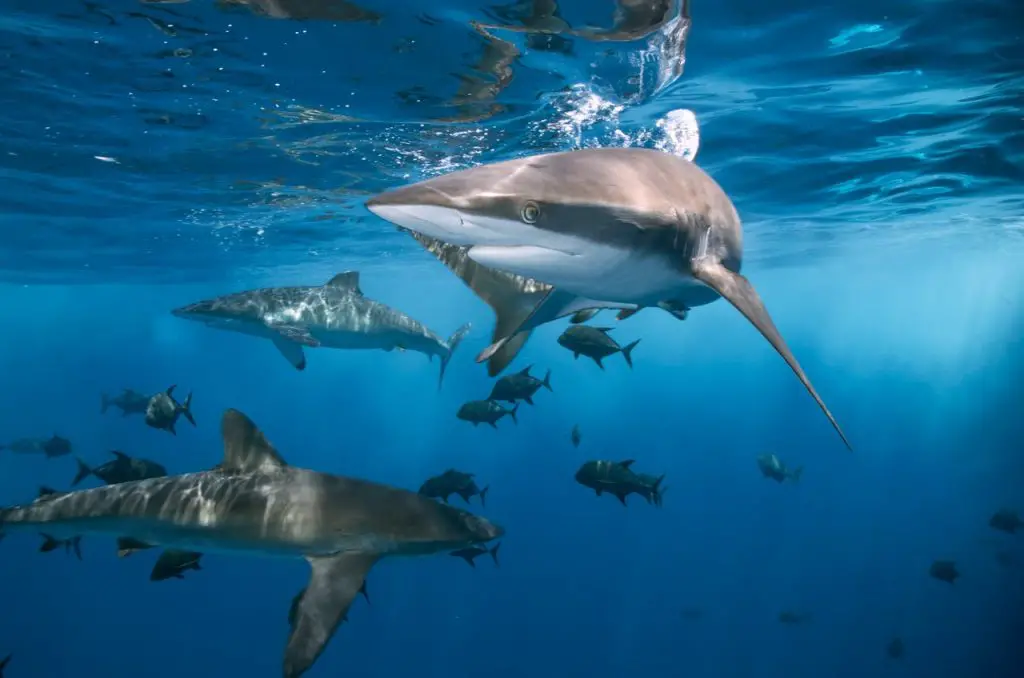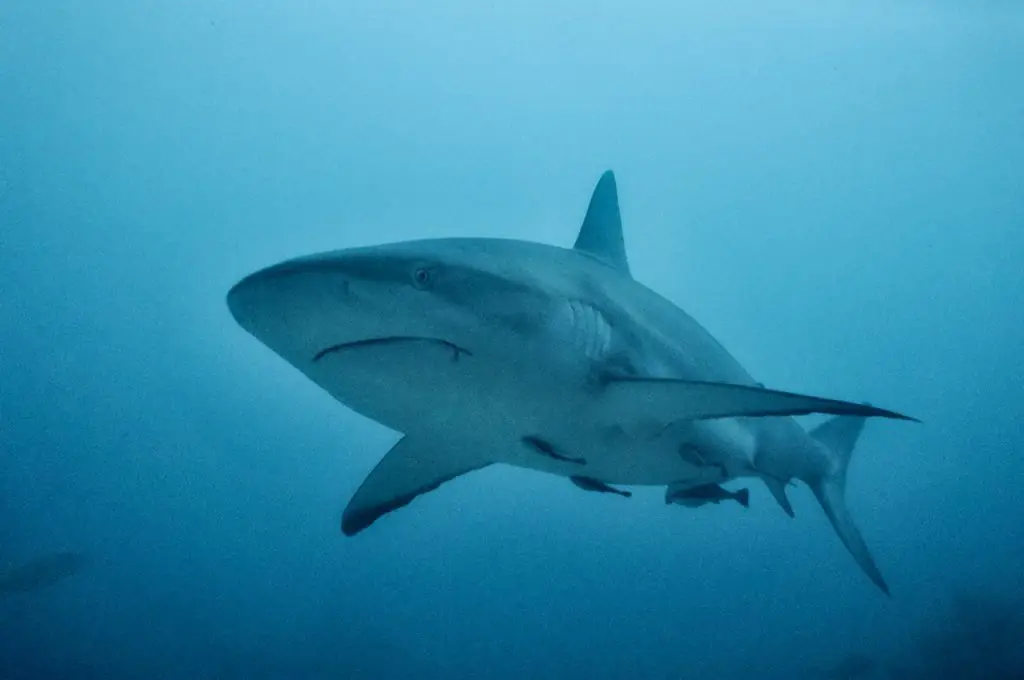Do Sharks Have Tongues? The same question I used to ask, so you’re not alone. Hence, I’ve put together this article to give you a clear understanding of whether sharks have tongues or not, what the tongue is made of, sharks can taste using it, and so on.
In short, sharks have tongues; the tongue is called “basihyal,” which depicts short, stout, small, and non-flexible; it has no taste buds and is not that beneficial. Only three sharks, namely carpet sharks, bullhead sharks, and cookie-cutter sharks, have good tongues that help them eat food.
Contents
Have Tongues

Sharks have tongues, just like humans and other animals, but shark’s tongues don’t serve the same purpose as we humans.
A human tongue is a multi-purpose organ, so we can use the tongue to taste the food, move food around in the mouth, be flexible, use our tongues to talk, and so on. Our tongue is deemed the strongest muscle in the body by mass. Still, a shark’s tongue does not serve these functions because many researchers consider a shark’s tongue to be a short, chubby, and immovable organ that serves no real purpose the shark. The tongue doesn’t even serve as a taste bud.
That is to say, a shark’s tongue or any other fish’s tongue is not called a tongue but “basihyal.”
Do you know that a shark’s body is made out of cartilages instead of bones? Are you also aware that Sharks don’t have ribs? Why? Simply because they do not require a cage of bone to protect vital organs like the lungs. For “lungs,” sharks have gills instead, which they breathe through it.
Since the shark’s body is made out of cartilages, a large portion of cartilage stretches forth to the mouth and provides support to these gills.
The tongue is positioned at the end of the large chunk; hence, the basihyal of sharks is located at the base of the shark’s mouth; the same is true for any other fish.
The positioning of the basihyal is also the same with human tongues, which puts an end to any similarities between a human’s tongue and a shark’s basihyal.
Can sharks taste using their tongue?
We taste as humans via our tongues the same way many other animals do; sadly, sharks do not have any taste buds in their basihyal because their taste buds are distributed around the inside of their mouths.
These taste buds are located under a special lining inside its mouth and throat. This lining is called the “Papillae.” So the tongue or the basihyal does not form part of the food tasting at all.
Sharks’ taste buds are not so sensitive; the taste buds enable the shark to know if the food is nutritious enough to eat – that does not mean sharks are considered as careful eaters because while swimming throughout the day, in search for food, sharks eat whatever is edible. They don’t taste the flesh of their prey; they eat whatever is eatable.
Carpet Shark And Bullhead Shark Tongues
Carpet sharks and bullhead sharks, known as orectolobids and heterodontoids respectively, have different basihyal that is quite different in function from the other sharks because they possess a very large basihyal, flattened, flexible and movable, meaning that these sharks can use their basihyal to suck on prey in confluence with their powerful pharyngeal muscles.
Still, before they fully eat their prey, they initially swallow part of the prey and use the taste buds in the mouth to identify if the prey is nutritious enough to take in or otherwise, so if the taste buds sense a familiar and edible taste, the prey is ok to be eaten up, so the prey will then move down the throat towards the stomach and be swallowed.
Cookie-cutter shark tongue
Another type of shark with a different basihyal type is the cookie-cutter shark “Isistius spp.” They possess a basihyal larger than the usual sharks have and are strengthened by strong rectus cervicis throat muscles.
The structuring of the basihyal exhibits that it’s connected to the throat muscles instead of the floor of the mouth.
So, it makes it easier for cookie-cutter sharks to suck “cookie-shaped” flesh bites out of their prey, mostly cetaceans, pinnipeds, pelagic fishes.
A Cookie-cutter shark tears its prey using its teeth to open the prey and uses its basihyal to take out and suck the flesh and all.
The tongue for cookie-cutter sharks serves as an “oral vacuum” feeding technique, sucking the prey’s flesh.
Sometimes, we bite our tongue as humans, and it’s usually painful. So do sharks do the same? I’ll talk about that in the coming subheading.
Do Sharks Bite Their Tongue?

Because sharks have sharp and piercing teeth, we may often think it’s possible sharks bite their tongue, but as for sharks, their basihyal functions just like humans. This means that sharks rarely bite their tongues. Here is a detailed explanation for you.
- Sharks basihyal is usually flat, immoveable, and exclusively secured to the floor of the mouth but does have some flexibility.
- The muscles are spread out extensively and contain nerve endings called proprioceptors.
- Proprioceptors monitor and pass on muscle tension and position, which transfers constant
and necessary signals to the brainstem. - The brainstem is aware of the position of the basihyal to allow the brainstem to fully coordinate the activities of the basihyal, such as biting, chewing, and even the size of the food particles.
A Sharks Sense Of Taste
A shark does not possess a highly developed sense of taste. The taste buds you’ll locate in the mouth, and throat lining of a shark is primarily for providing a yes or no confirmation of if a food is edible or otherwise. You’ll not find any taste sensation connected to the taste buds.
CONCLUSION: Do Sharks Have Tongues?
- By now, I’m sure you understand that sharks have tongues, but it isn’t called tongues.
- Now you know that sharks’ basihyal functions differently from the human’s tongue.
- Finally, you got to understand the species of sharks with different tongues and even different functions from the usual shark’s basihyal.
Related Questions
Can a shark stick out its tongue?
A shark’s tongue is supposed to be the tangible organ of its body as sharks don’t bite yet swallow prey. Will sharks stick their tongue out? A shark’s supposed tongue is short, minuscule, and bold with no taste buds. Thus, they can’t stick their tongue out of their mouth.
Do sharks fart?
Yes, sand sharks gulp air at the surface which they release to achieve greater depth. This is the only shark species that farts. Source
Can sharks scream?
Unlike their noisy neighbors, sharks have no organs for producing sound. Even their scales are modified to allow them to slip through the water in ghost-like silence. But there are persistent reports from New Zealand of a type of shark that actually barks like a large dog. Source

